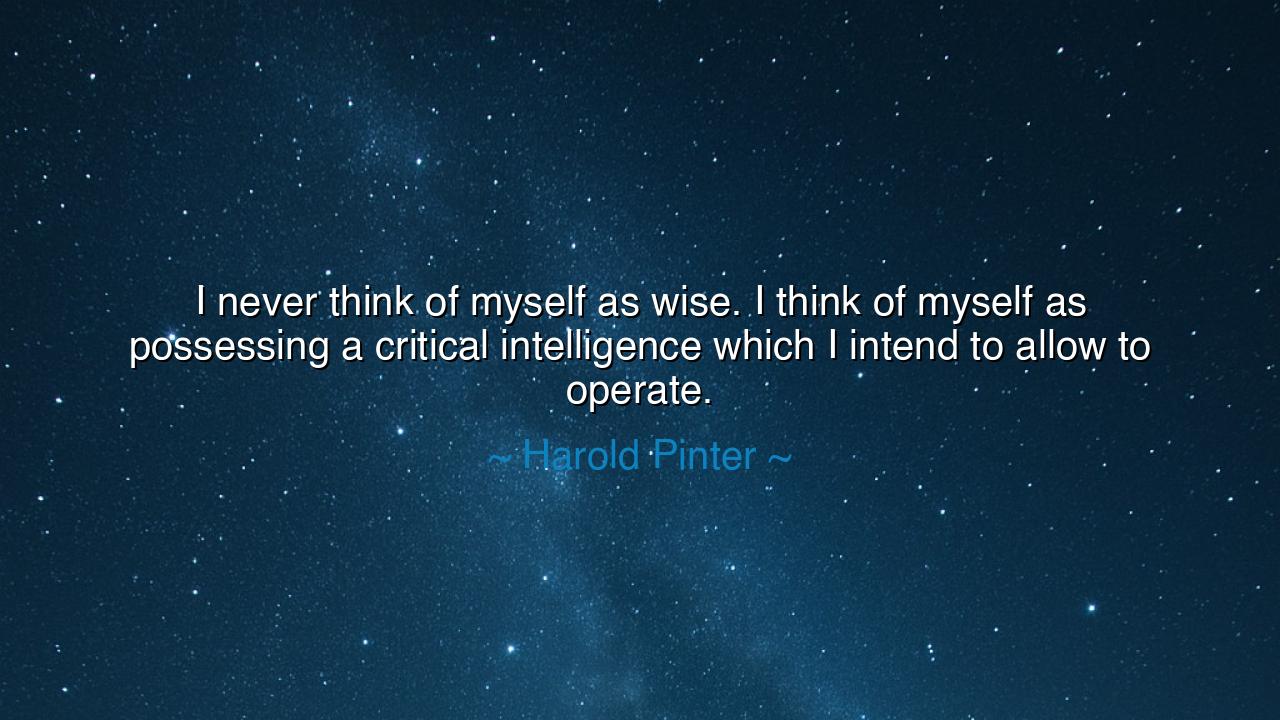
I never think of myself as wise. I think of myself as possessing
I never think of myself as wise. I think of myself as possessing a critical intelligence which I intend to allow to operate.






The words of Harold Pinter, “I never think of myself as wise. I think of myself as possessing a critical intelligence which I intend to allow to operate,” are like a river that flows quietly, yet cuts through mountains with time. In these words lies the humility of the thinker and the courage of the seeker. He who calls himself wise has already sealed the gates of his understanding; but he who honors his critical intelligence keeps those gates forever open to the winds of truth. For wisdom, if it becomes pride, ceases to grow. But intelligence, if it remains alive, questions even its own certainty.
Pinter, the playwright whose silences spoke louder than words, was no mere artisan of drama—he was a craftsman of truth’s unease. In the theatre of his mind, truth was never simple, nor men wholly right or wrong. His quote arose from this philosophy: that to be truly alive, the mind must never be lulled by the comfort of believing itself wise. It must remain restless, probing, skeptical, even of its own conclusions. Thus, he did not seek the crown of the sage but the freedom of the questioner. He did not want his thoughts to become monuments; he wanted them to remain arrows in flight, seeking targets yet unseen.
To understand the depth of these words, recall the ancient tale of Socrates, who, when hailed as the wisest of men, answered, “I know that I know nothing.” It was not false modesty—it was insight. For Socrates understood that true intelligence is not the hoarding of answers, but the courage to face the vastness of what one does not yet know. When others argued to win, he inquired to understand. His critical intelligence was the lamp that illuminated ignorance, not the banner of victory over it. And so, through questioning, he awakened a civilization.
In Pinter’s spirit and in Socrates’ echo, we find this truth: wisdom that claims certainty becomes arrogance, but critical intelligence that continues to question becomes the seed of real understanding. To think critically is to resist the temptation of easy answers; it is to let reason move through you as breath through the lungs—unceasing, invisible, vital. Such intelligence is not chained by ideology, nor seduced by applause. It is loyal only to the pursuit of what is real.
Yet this path is not easy. The world often rewards confidence over contemplation, noise over thought. Many call themselves “wise” and speak loudly, yet their hearts are closed. The one who practices critical intelligence may walk alone, misunderstood, even doubted. But the ancients knew that solitude is the forge of truth. The hermit, the philosopher, the artist—each must descend into silence to listen for what others cannot hear. As Pinter’s own characters revealed, meaning is born not in certainty, but in tension—in the pauses, the questions, the unease.
There is a lesson here for all who would live thoughtfully: do not strive to be wise—strive to be awake. Wisdom may be the end of inquiry, but intelligence is the pulse that keeps inquiry alive. To be awake is to see the world as a living question, not a finished book. Let your critical intelligence operate—test your beliefs, challenge your emotions, observe without haste. The mind that never stops questioning is the mind that never stops growing.
In your daily life, practice this discipline: before speaking, ask yourself why you believe what you believe. When you encounter disagreement, listen—not to refute, but to understand. When you feel certain, pause and look again. Let critical intelligence temper your pride and deepen your understanding. Like the sculptor who reveals form by chipping away the stone, shape your mind by removing assumptions.
Thus, remember Harold Pinter’s humble creed: Do not seek to be called wise; seek instead to let your intelligence breathe. For wisdom that boasts is brittle, but intelligence that questions is eternal. The mind that operates freely—without vanity, without fear—becomes a vessel of truth. And such a mind, though it may never call itself wise, will one day become the quiet voice through which wisdom itself chooses to speak.






AAdministratorAdministrator
Welcome, honored guests. Please leave a comment, we will respond soon